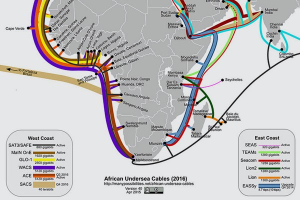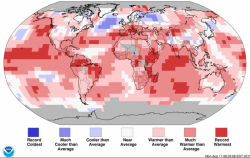
Technology represents an irresistible tide.
No matter how tightly Republicans cling to the resource economy technology is overtaking it and, in doing so, destroying any hope his politics may have for a future.
We are on an accelerating track of change in which human capital means more-and-more, all other types of capital less-and-less. Devotion to the interests of the resource industries is counterproductive. That’s good for China, great for India and East Asia, even good news for Africa and Latin America. All the Middle East needs is a little peace to realize that Israel is a better economic model to follow than Saudi Arabia.
Revolutions are coming. Good ones.

Technological change is a bit like the story of the boiling frog, which supposedly doesn’t realize the water is heating up slowly around him until after he has cooked. A better analogy is to life itself. You don’t really see how time is changing you from day-to-day. You need perspective.
Just think of how far we’ve come in the last 8 years. I’ve gone gray, my kids have grown up, but in many ways the whole world is brand new.

In 2008, clouds were barely a thing, and Amazon.com was a flailing e-commerce outfit, its shares hovering near $50/share. You could buy Nvidia for under $8/share, and Google for under $200.
Renewable energy was not competitive against fossil fuels unless it had huge subsidies from the government.
Drones did not exist in 2008. Artificial intelligence was a joke. Gaming was something you did in front of a TV, on a Sony Playstation. Social networking was a brand-new phenomenon, whose folkways had yet to be imagined. People were charging for WiFi, and couponing was the loyalty program of choice. No one had heard of Bitcoin. It took days to do a DNA test.

Think of what that means for a moment. People in the bush can now reach markets are readily as you can. A kid with an idea can investigate it from any urban street corner. About 130,000 people now enter the global middle class now each day – that means they have a place to live, enough to eat, and hope for their kids. It means they’re able to use this stuff. East Asia is almost entirely middle class now, and growth is spreading into sub-Saharan Africa and across Latin America.
Change will only accelerate from here. Solar and wind energy are already price-competitive with fossil fuels. They’re about to get the price advantage, and any policy that tries to raise energy prices is doomed to failure, because developing countries will take the savings. Efficiency will continue to increase, the cheapest renewable energy of all. As new types of solar cells based on perovskites and plastics hit the market, even natural gas prices will not be safe. Electric cars will become cheaper to run than the one you have now, and many will drive themselves, making Ubers even-more common, accelerating the replacement of fossil fuel fleets.

These are just enabling technologies. What we do with them is unknown. Gaming is merging with virtual reality. Virtual meetings are coming where the nuances we now rely upon in face-to-face communication will be available to us, even from home. Anyone without a clear social networking profile will be suspicious.
Robots, of the kind envisioned by Isaac Asimov almost a century ago, will finally be real four years from now. Your appliances will respond to the sound of your voice, your lawn will water itself when that’s needed, and repair trucks will arrive before you need to call them. These things are already starting to happen. Soon they will be commonplace.
Demographic change is also accelerating. Japan is falling off the demographic cliff, too old to care for itself, and China is about to follow suit. We’re leaving an age of unemployment, entering an age of labor scarcity, which means even unskilled labor will become dear.

No politician can deny any of this. It’s baked in. Do you think any Administration wedded to the economic models of the past has a chance of creating prosperity in a time of accelerating change, where human capital is what counts and resources can be substituted for easily?
My kids understand this, but many in their generation are too self-absorbed and cynical to take control over society. They doubt their power. Give them something to fight and they’ll find it.
I predict a bear market in cynicism to go along with a bull market in stupid. A consensus is emerging, a global consensus, the Cold Wars of the past replaced by the Climate Wars of the future, and nothing any politician does or says can stop it, because it’s driven by technology.
Stop whining.








